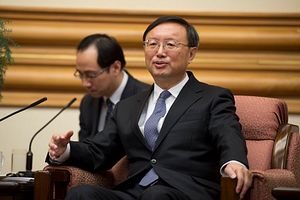China’s Foreign Ministry announced today that State Councilor Yang Jiechi, one of China’s top foreign policy advisers, is heading to Vietnam. Yang is schedule to co-host an annual diplomatic meeting with Vietnam’s Deputy Prime Minister and Foreign Minister Pham Binh Minh on June 18. It will be the highest-level bilateral meeting between China and Vietnam since the two countries began butting heads over the placement of a Chinese oil rig.
Foreign Ministry spokesperson Hua Chunying noted that Yang’s visit was pre-planned; he will be in Hanoi for the annual Chairmen’s Meeting of the China-Vietnam Steering Committee of Bilateral Cooperation. However, the recent spat between China and Vietnam will obviously be on the agenda. Hua expressed China’s hope for “candid and thorough” talks. “We hope that Vietnam can bear in mind the big picture, work with China towards the same goal and properly deal with the current situation,” she said.
Vietnam has also expressed hope that Yang’s visit can help ease tensions. The Associated Press quoted a Vietnamese Foreign Ministry spokesperson as saying, “This meeting, therefore, will surely be a channel and an event where the two sides can discuss the issue to find solutions to the current tension.”
However, Yang and Minh’s previous conversation, held by telephone in early May, merely saw the two men trade denunciations and accusations, according to comments by both foreign ministries. Indeed, the two have something of a history of ratcheting up South China Sea tensions rather than alleviating them. Minh has been quite outspoken about the current oil rig crisis, while in 2010, Yang Jiechi famously dismissed criticisms of Beijing’s South China Sea policies by saying “China is a big country and other countries are small countries.”
Still, the meeting between Yang and Minh is the first positive sign in China-Vietnam relations since China announced the operations of its oil rig on May 1. It could provide the chance for diplomatic progress. For the last six weeks, though both Beijing and Hanoi have claimed to be open to talks, the two governments have done little more than trade tit-for-tat accusations over the current crisis. It will take significantly more flexibility for the two to make any sort of breakthrough on Wednesday.
As of now, there seems to be little room for compromise. China has repeatedly stated that it will not give an inch on territorial issues. Agreeing to remove the oil rig would be seen as just such a concession domestically, something China’s vocal nationalists would not accept. Meanwhile, Vietnam’s government has decided to draw a line in the sand with the Chinese oil rig, having seemingly decided that this perceived violation of Vietnam’s EEZ is the last straw. Given domestic outrage (which has even boiled over into violent riots), it will be hard for Hanoi to walk back comments on China’s “illegal actions” in the South China Sea without getting at least some concessions from Beijing.
Given these factors, it’s unlikely that we will see any real progress on ending the current crisis. But regardless of the outcome, the meeting is a small step towards a return to diplomatic normalcy. And diplomatic normalcy, while not in itself a panacea, is a prerequisite for the eventual resolution of the crisis.
The immediate crisis itself, interestingly enough, has an expiration date — August 15, when the oil rig is scheduled to finish its exploratory operations. China may be hoping it can simply keep tensions manageable until then, when the rig can be withdrawn with its point made.
































